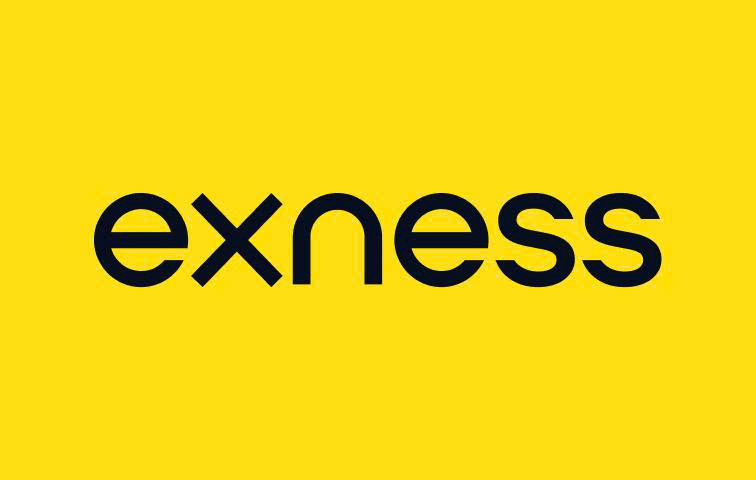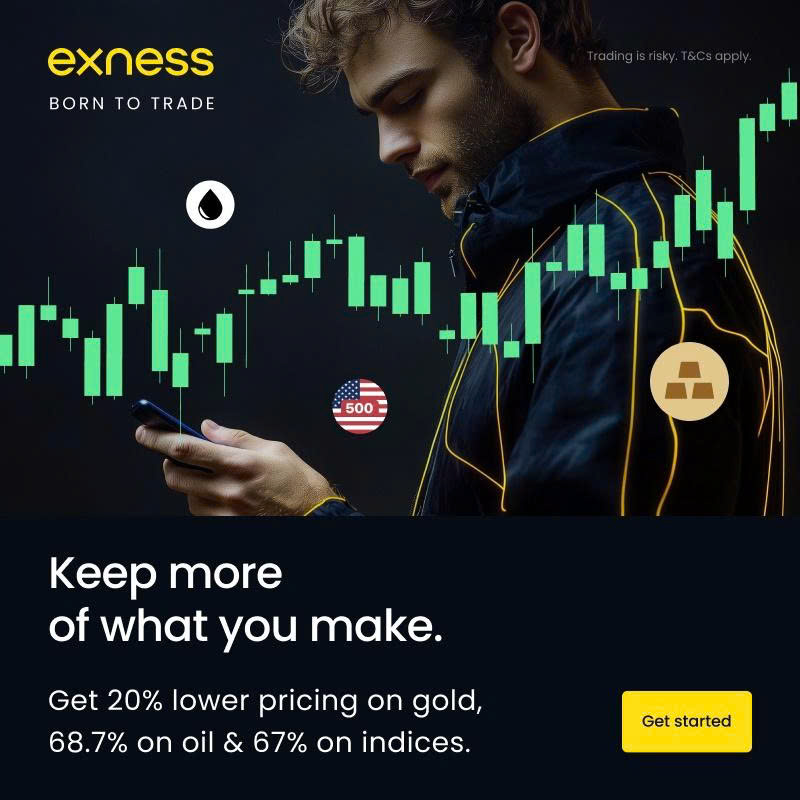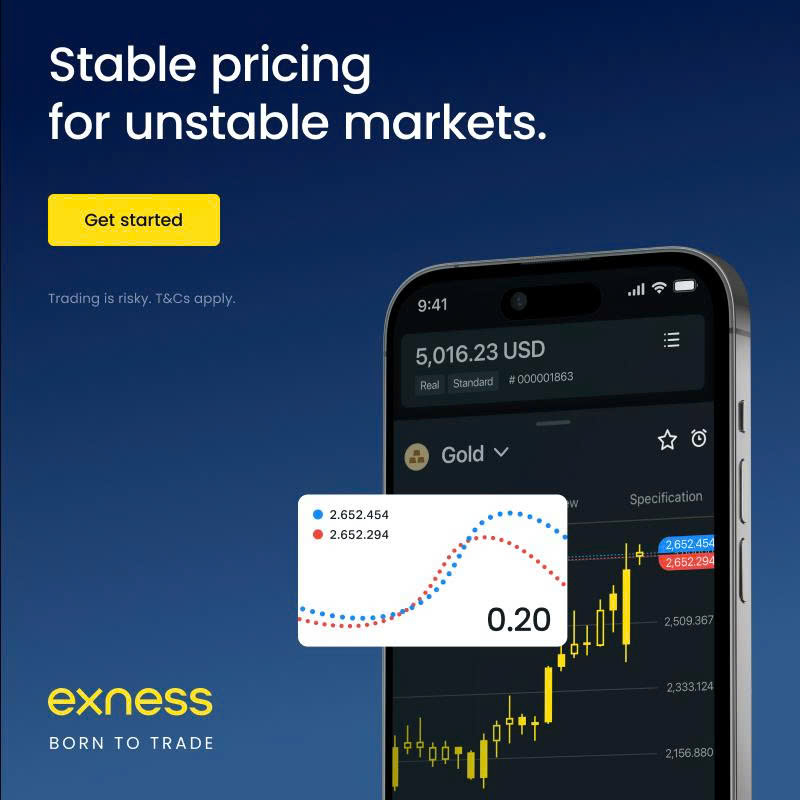
10 minute read
Exness Minimum Deposit in Nigeria: A Comprehensive Guide
from Exness
by Exness Blog
In this comprehensive guide, we’ll explore everything you need to know about the Exness minimum deposit in Nigeria, including account types, deposit methods, fees, and practical tips for getting started. Whether you’re new to forex trading or an experienced trader looking to your strategy, this article will help you make informed decisions in 2025.

💥 Trade with Exness now: Open An Account or Visit Brokers 🏆
Why Exness is Popular Among Nigerian Traders
Exness, founded in 2008, is a globally recognized forex and Contracts for Difference (CFD) broker headquartered in Limassol, Cyprus. With over 1 million active users and a monthly trading volume of $4.8 trillion as of February 2025, Exness has established itself as a trusted platform for traders worldwide.
For Nigerian traders, Exness offers several compelling features:
Low Minimum Deposits: Starting at just $1 for some accounts, Exness makes forex trading accessible to beginners with limited capital.
Naira-Based Accounts: Traders can deposit, trade, and withdraw in Nigerian Naira (NGN), eliminating currency conversion fees and shielding against exchange rate volatility.
Diverse Account Types: Exness provides options for both novice and experienced traders, from Standard to Professional accounts.
High Leverage: With leverage up to 1:2000 (and even unlimited for eligible accounts), traders can amplify their positions, though this comes with significant risks.
Local Payment Methods: Exness supports bank transfers, e-wallets, and other methods tailored for Nigerian traders.
Regulatory Oversight: Exness is regulated by top-tier authorities like the Financial Conduct Authority (FCA) in the UK, Cyprus Securities and Exchange Commission (CySEC), and the Capital Markets Authority (CMA) in Kenya, ensuring a secure trading environment.
These features make Exness a top choice for Nigerians looking to enter the forex market without significant financial commitment. But how much do you need to start trading with Exness in Nigeria? Let’s dive into the details.
Exness Minimum Deposit Requirements in Nigeria
The minimum deposit required to start trading with Exness in Nigeria varies depending on the account type and payment method. Below, we break down the minimum deposit requirements for each account type available to Nigerian traders in 2025.
1. Standard Accounts
Exness Standard Accounts are ideal for beginners or traders with limited capital. There are two types:
Standard Account:
Minimum Deposit: $10 (approximately ₦16,000, depending on exchange rates).
Features: Commission-free trading, spreads starting from 0.2 pips, and leverage up to 1:2000. This account supports a wide range of instruments, including forex pairs, metals, cryptocurrencies, and indices.
Who It’s For: Beginners and casual traders looking to start with a low investment.
Standard Cent Account:
Minimum Deposit: $1 (approximately ₦1,600).
Features: Designed for micro-trading, with trade sizes displayed in cents to minimize risk. Spreads start from 0.3 pips, and there are no commissions.
Who It’s For: New traders who want to practice with minimal financial exposure.
The low minimum deposit of $1 for the Standard Cent Account makes Exness one of the most accessible brokers for Nigerian traders.
2. Professional Accounts
Exness Professional Accounts cater to experienced traders seeking advanced features and tighter spreads. These accounts require higher minimum deposits:
Pro Account:
Minimum Deposit: $200–$500 (approximately ₦320,000–₦800,000, depending on the region and payment method).
Features: Tighter spreads starting from 0.1 pips, no commissions, and access to advanced trading tools.
Who It’s For: Active traders looking for lower trading costs.
Raw Spread Account:
Minimum Deposit: $200–$500.
Features: Ultra-low spreads starting from 0.0 pips with a commission per trade.
Who It’s For: Scalpers and high-frequency traders seeking minimal spread costs.
Zero Account:
Minimum Deposit: $200–$500.
Features: Zero spreads on major instruments for 95% of the trading day, with a commission per trade.
Who It’s For: Traders prioritizing minimal spread costs.
3. Social Trading Accounts
Exness also offers social trading accounts for those interested in copying strategies or sharing their own:
Social Standard Account:
Minimum Deposit: $500 (approximately ₦800,000).
Features: Spreads start from 1 pip, no commissions.
Who It’s For: Traders who want to copy strategies or earn by sharing their trades.
Social Pro Account:
Minimum Deposit: $2,000 (approximately ₦3.2 million).
Features: Tighter spreads starting from 0.6 pips, no commissions.
Who It’s For: Experienced traders or strategy providers aiming to maximize profits.
Portfolio Management Accounts:
Pro (Portfolio Management): No minimum deposit.
Social Pro (Portfolio Management): $500 (approximately ₦800,000).
Who It’s For: Traders requiring portfolio management services.
For most Nigerian traders, especially beginners, the Standard and Standard Cent Accounts are the best starting points due to their low minimum deposits and beginner-friendly features.

💥 Trade with Exness now: Open An Account or Visit Brokers 🏆
How to Deposit Funds on Exness in Nigeria
Funding your Exness account in Nigeria is straightforward, thanks to the platform’s support for local and global payment methods. Here’s a step-by-step guide to depositing funds:
Log into Your Personal Area: Access your Exness account via the website exness.com or mobile app and sign in to your Personal Area (PA).
Navigate to the Deposit Section: Click “Deposit” on the left-hand menu.
Choose a Payment Method: Select from available options, such as bank transfers, e-wallets, or bank cards. You can filter for instant methods by enabling the “Only Instant Methods” option.
Select Your Account and Currency: Choose the trading account you want to fund and select NGN as the currency to avoid conversion fees.
Enter the Deposit Amount: Input an amount above the minimum required for your account type (e.g., $10 for Standard Accounts).
Confirm the Transaction: Follow the on-screen prompts, which may include entering payment details or receiving a text message for confirmation. Funds typically reflect within 30 minutes, depending on the method.
Popular Deposit Methods for Nigerian Traders
Exness supports a variety of deposit methods tailored for Nigerian traders:
Bank Transfers:
Minimum Deposit: $10 (₦16,000).
Processing Time: Up to 30 minutes for deposits, 24 hours for withdrawals (minimum withdrawal: $3 or ₦4,800).
Details: Supports local banks like Wema Bank, making it convenient for traders preferring traditional banking.
Bank Cards (Visa, Mastercard):
Minimum Deposit: $10 (₦16,000).
Processing Time: 30 minutes for deposits, 24 hours for withdrawals (minimum withdrawal: $3 or ₦4,800).
Details: Secure transactions with 3D security protocols.
E-Wallets (Skrill, Neteller, Perfect Money):
Minimum Deposit: $10 (₦16,000) for Skrill and Neteller; $10 for Perfect Money.
Processing Time: 30 minutes for deposits (10 minutes for Perfect Money), 24 hours for withdrawals (minimum: $10 for Skrill, $4 for Neteller, $2 for Perfect Money).
Details: Ideal for traders seeking fast, low-fee transactions.
Cryptocurrency (Bitcoin, Tether):
Minimum Deposit: $10.
Processing Time: Varies based on blockchain network; withdrawals take up to 3 business days (minimum: $100 for USDT).
Details: Suitable for traders holding digital assets, though blockchain fees may apply.
Exness does not charge deposit or withdrawal fees, but third-party providers (e.g., banks or e-wallet services) may apply transaction charges. Always verify fees with your payment provider.
Key Benefits of Exness’s Low Minimum Deposit in Nigeria
The low minimum deposit requirements offered by Exness provide several advantages for Nigerian traders:
Accessibility for Beginners: The $1 minimum deposit for the Standard Cent Account allows anyone, regardless of financial background, to start trading with minimal risk. This is particularly significant in Nigeria, where economic disparities can limit access to financial markets.
No Currency Conversion Fees: By supporting Naira-based accounts, Exness eliminates the need for costly currency conversions, making trading more cost-effective.
Risk Management: Low deposits encourage disciplined trading, especially with the Standard Cent Account, where micro-trading reduces the risk of significant losses.
Flexibility to Test Platforms: With a minimal investment, traders can explore Exness’s platforms (MetaTrader 4, MetaTrader 5, and the Exness Terminal) and test strategies without committing large sums.
Diverse Payment Options: Support for local banks, e-wallets, and cryptocurrencies ensures Nigerian traders can fund accounts conveniently.
Comparing Exness with Other Brokers in Nigeria
To understand the value of Exness’s minimum deposit, let’s compare it with other popular forex brokers in Nigeria:
HFM (HotForex): Minimum deposit starts at $5 for Micro Accounts but can go up to $100 for Premium Accounts.
XM: Requires a $5 minimum deposit for Micro and Standard Accounts.
Pepperstone: Typically requires a $200 minimum deposit, significantly higher than Exness’s Standard Accounts.
IC Markets: Minimum deposit of $200, less competitive than Exness’s $1–$10 for Standard Accounts.
FXTM: Minimum deposit of $10, matching Exness’s Standard Account but higher than the Standard Cent Account.
Exness’s $1–$10 minimum deposit for Standard Accounts is among the most competitive in Nigeria, especially when paired with Naira-based accounts and local payment methods.
Tips for Nigerian Traders Starting with Exness
To maximize your trading experience with Exness in Nigeria, consider these practical tips:
Start with a Demo Account: Practice trading risk-free to master the platform and test strategies before depositing real funds.
Choose Naira-Based Accounts: Select NGN as your account currency to avoid conversion fees and shield against exchange rate fluctuations.
Manage Leverage Carefully: High leverage (up to 1:2000) can amplify profits but also losses. Use it cautiously and align with your risk tolerance.
Verify Your Account: Complete account verification before depositing to avoid delays in fund processing.
Monitor Fees: While Exness doesn’t charge deposit or withdrawal fees, third-party providers may. Check with your bank or e-wallet provider.
Start Small: Begin with the Standard Cent Account to practice with minimal risk, especially if you’re new to forex trading.
Stay Disciplined: Define clear trading goals, establish a risk management plan, and avoid emotional trading decisions.
Potential Drawbacks and Risks
While Exness offers numerous advantages, there are some considerations for Nigerian traders:
No Local Regulation: Exness operates under offshore licenses (e.g., FSA Seychelles), which may concern traders seeking local oversight by the Central Bank of Nigeria (CBN). However, its global regulations (FCA, CySEC) provide robust security.
Withdrawal Delays: Bank transfers can take several days, depending on the provider. E-wallets and crypto are faster alternatives.
High Leverage Risks: Unlimited leverage can lead to significant losses if not managed properly. Beginners should use lower leverage settings.
Third-Party Fees: While Exness doesn’t charge fees, banks or e-wallet providers may apply transaction charges.
Is Exness Safe for Nigerian Traders?
Exness is considered a safe broker for Nigerian traders due to its robust regulatory framework and security measures:
Regulation: Licensed by FCA (UK), CySEC (Cyprus), CMA (Kenya), and FSCA (South Africa), Exness adheres to strict standards for transparency and fund safety.
Segregated Accounts: Client funds are held in segregated accounts with top-tier banks, ensuring they’re not used for the broker’s operational needs.
Negative Balance Protection: Traders cannot lose more than their initial deposit, protecting against account wipeouts.
Audits: Regular audits by Deloitte ensure financial transparency.
Encrypted Transactions: Advanced security protocols protect client data and funds.
While Exness is not regulated by the CBN, its global oversight and safety features make it a reliable choice for Nigerian traders.
Conclusion: Is Exness the Right Choice for Nigerian Traders?
Exness’s low minimum deposit requirements, starting at just $1 for the Standard Cent Account and $10 for the Standard Account, make it an attractive option for Nigerian traders in 2025. Its support for Naira-based accounts, diverse payment methods, and competitive trading conditions further enhance its appeal. Whether you’re a beginner testing the waters or an experienced trader seeking advanced features, Exness offers flexible account types to suit your needs.
However, forex trading carries inherent risks, especially with high leverage. Nigerian traders should start with a demo account, choose Naira-based accounts to avoid conversion fees, and practice disciplined trading to maximize success. By understanding Exness’s minimum deposit requirements and leveraging its user-friendly platform, you can embark on your forex trading journey with confidence.
💥 Note: To enjoy the benefits of the partner code, such as trading fee rebates, you need to register with Exness through this link: Open An Account or Visit Brokers 🏆
Read more:










